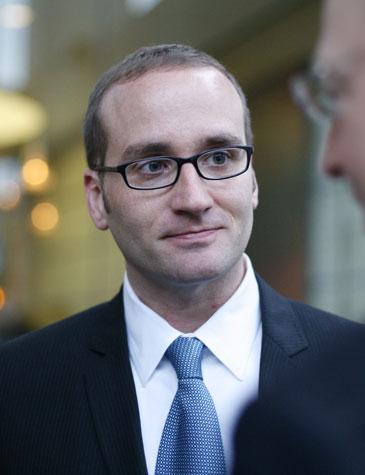Money makes the world go 'round. And extra dollars fuel the fight for equality.
The Human Rights Campaign (HRC), the nation's largest LGBT civil rights organization, announced Aug. 6 it would spend $1 million in the four states facing marriage-related ballot measures in November: Maine, Maryland, Minnesota and Washington.

Chad Griffin
(Photo by HRC)
HRC has established a distinct PAC, or political action committee, in each of the states to help fund the fight at the ballot box. The $1 million will be split evenly among the four states.
In Maine, voters will be asked to approve a citizen-backed initiative to issue marriage licenses to same-sex couples. In Maryland and Washington, voters will be asked to uphold marriage-equality laws recently passed by their respective state Legislatures and signed into law by Governors Martin O'Malley (D) and Christine Gregoire (D), respectively.
In Minnesota, where same-sex marriage is already banned by statute, voters will be asked to decide if they want to change their state's constitution by inserting additional language that would specifically ban same-sex partners from marrying.
''This is a tipping-point year in the fight for marriage equality that requires significant investment,'' HRC President Chad Griffin said in a statement. ''We are committed to making sure this is the year that our opponents can no longer claim Americans will not support marriage equality at the ballot box.''
Polling in Maine and Washington show a majority of voters saying they favor allowing same-sex couples to marry, with supporters of marriage equality holding a 22-point edge in Maine and a 7-point edge in Washington. Polls in Minnesota have largely shown voters to be evenly divided over the constitutional ban, though a recent SurveyUSA poll gave supporters of the ban a 15-point edge.
''Bans on marriage for same-sex couples have sent the devastating message to young people that they cannot grow up to live their dreams and be full and equal citizens,'' Griffin said in a statement. ''This is the year we will change that.''
HRC's $1 million investment brings the total amount the organization has contributed to legislative and electoral marriage issues for the 2011-2012 cycle to $4.8 million.
As of Metro Weekly press deadline Tuesday night, HRC had not responded to a question regarding the amount of money received by each state for the cycle. But Fred Sainz, vice president of communications and marketing, confirmed that the amount of money given to each state during the cycle has been different for each one. Sainz said the distribution to each state has been ''situational and opportunistic, as to the needs of each state.''
Griffin added, ''All of these campaigns are winnable but they need resources to educate voters and fight back the lies from groups like the National Organization for Marriage. The country is moving in the direction of equality and a win in any of these states will show that marriage equality is quickly becoming a mainstream, American value.''
In response to HRC's announcement, Marylanders for Marriage Equality's campaign manager, Josh Levin, said the campaign was ''grateful'' for the investment and thanked them for being a ''tremendous partner'' in the effort to uphold the marriage-equality law.
In Maryland, as in Maine and Washington, a majority of registered voters say they would vote to uphold the state's recently passed marriage-equality law. The results of a July poll by Hart Research show 54 percent of voters saying they'd vote in favor of the law and 40 percent say they'd vote against it. The margin of error for that poll was plus or minus 4.5 percentage points.
The Hart Research poll also showed supporters of marriage equality holding an 8-point edge in terms of intensity, with 43 percent of voters saying they ''strongly'' support marriage equality and 35 percent saying they ''strongly'' oppose it. That marks a 7-point swing since March, when another Hart Research poll found ''strong'' sentiment evenly divided. According to the July poll, voters who say the referendum is ''extremely important'' favor the marriage equality law by a 2-1 margin over opponents of the law, 66 percent to 33 percent.
White voters favor upholding the marriage law by 13 points, with 54 percent supporting it and 41 percent opposed, up from a 53-42 margin in March. But much of the momentum from Hart's last poll came from African-Americans, who are now evenly divided, with 44 percent in favor and 45 percent opposed. That marks an increase from a March Hart poll, when only 40 percent of African-Americans supported the marriage-equality law and 49 percent were opposed.
''We're winning over undecided and the intensity is clearly on our side,'' Levin had said in an Aug. 2 statement following release of the poll data. ''Voters are realizing that this law is about treating our gay friends, family and neighbors equally under the law, and that no religious institution would be forced to marry anyone they objected to.''
But the Hart Research poll, while favorable, was less rosy than a May poll by Public Policy Polling (PPP) that found support for the law leading by 20 points, 57-37. That poll's margin of error was plus or minus 3.4 percent.
That May poll also found an increase in support among African-Americans following the endorsement of marriage equality by President Barack Obama and the National Association for the Advancement of Colored People (NAACP). But it placed the margin of support for the law among African-American voters much higher, leading by 55 percent to 39 percent.
...more